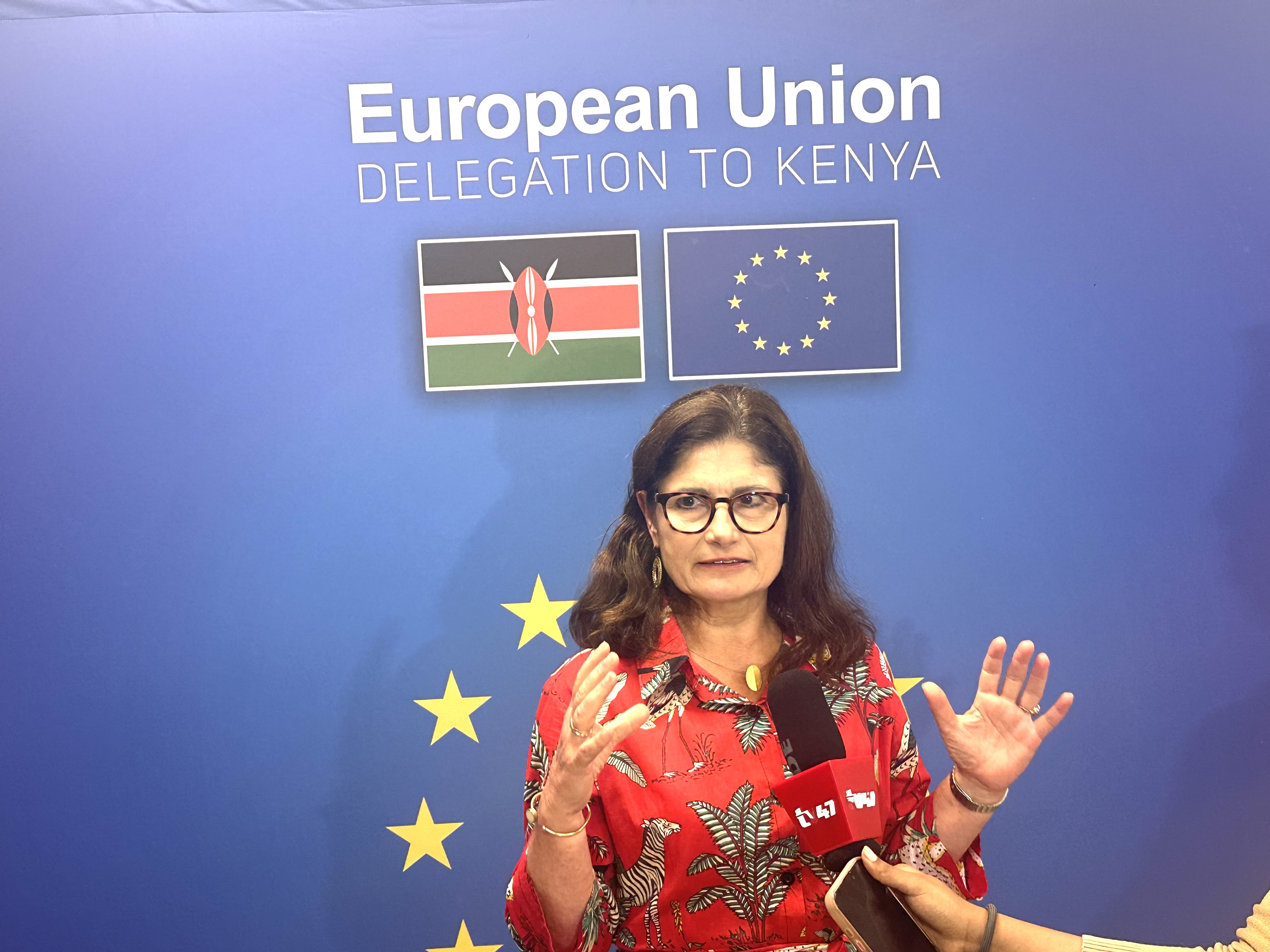
 EU Ambassador Henriette Geiger during a press briefing at the EU Delegation mission in Westlands on Tuesday, November 18, 2025
EU Ambassador Henriette Geiger during a press briefing at the EU Delegation mission in Westlands on Tuesday, November 18, 2025
EU Ambassador Henriette Geiger expressed the concerns during
a media briefing on the upcoming EU-AU seventh summit in Angola on November
24-25.
Ambassador Geiger said Kenya will during the summit hold a
side meeting on South Sudan, even as she underscored how closely Kenya’s
refugee strategy is tied to developments in its troubled neighbour.
She warned that unless South Sudan is stabilised, its unraveling
would “quickly destabilise the whole region,” triggering fresh refugee flows
into Kenya. She cautioned that such an escalation could overwhelm the country’s
systems and undermine years of integration efforts.
“The stability of South Sudan is vital for Kenya’s
stability. One example is the Shirika Plan. We’re talking about integrating the
more than 800,000 refugees into their host communities.
“Now imagine South Sudan blows up—there will be millions
of new refugees coming in. Then what to do? First, Shirika goes down the drain,
and then Kenya has a new problem with millions of refugees—and overall
support for refugees is going down,” Amb Geiger said.
She noted that preventing a conflict is far better than
intervening in the aftermath.
Kenya’s Shirika Plan aims to absorb refugees into host
communities and reduce pressure on crowded camps. But Geiger warned that a
violent escalation in South Sudan could upend that model, sending potentially
millions fleeing across the border if political dialogue fails.
South Sudan has seen a sharp spike in violence since
February 2025, especially in Upper Nile State, with renewed communal clashes in
counties such as Nasir, Baliet and Fangak, according UNHCR.
These hostilities have triggered internal displacement in
South Sudan and cross-border flight.
Already, UNHCR in South Sudan has said the renewed fighting
has forced hundreds of thousands to flee once again.
The commission says the renewed violence has forced at least
300,000 people out of the country, with 25,000 ending up in Kenya.
This worsens an already dire regional refugee crisis.
Kenya already hosts hundreds of thousands of refugees in
Garissa’s Dadaab camp and and Turkana’s Kakuma camp.
The country, the camps and aid agencies are now grappling
with a fresh wave of arrivals despite limited resources and stretched
humanitarian systems.
Already, Kenya is hosting 854,876 registered refugees and
asylum seekers from more than 20 countries as of June this year, straining
local resources.
Ambassador Geiger pointed out that Kenya’s current refugee
numbers make the country vulnerable, and any large-scale return of instability
could reverse years of progress under the Shirika Plan.
To avert a potential humanitarian catastrophe, Kenya is
spearheading a major diplomatic initiative at the upcoming EU–African Union
summit.
In the high-level ministerial side meeting, Kenya will host
frontline states directly affected by South Sudan—including Ethiopia and
Uganda—along with South Africa, EU representatives, and the “Troika” of South
Sudan external partners (the UK, the US, and Norway).
Geiger described the move as a “very laudable” effort by
Kenya to revive dialogue on South Sudan’s future, following the stalling of the
Tumaini process.
The EU’s alarm comes amid a broader regional turbulence that
compounds the urgency. Sudan, neighbouring South Sudan, remains mired in a
brutal civil war between the Sudanese Armed Forces and the paramilitary Rapid
Support Forces.
Such instability in Sudan threatens to fuel more
displacement across the region.
As of mid-2025, more than 80,000 people, including some
45,000 South Sudanese, have fled into Sudan, creating further strain on refugee
and humanitarian systems, UNHCR says.
Geiger said the EU’s engagement is pushing for preventative
diplomacy as well as support for regional institutions such as IGAD.
With the EU special envoy for the Horn of Africa headed to Nairobi next
week—and expected to attend the high-level South Sudan meeting—the EU is signalling
more interest in the region in the face of escalating tensions in the Horn.















